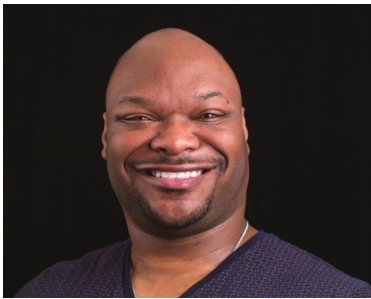
KASTON ANDERSON- CARPENTER: HEAVY LIFT Many things set MSU psychology prof Kaston Anderson-Carpenter, 35, apart from most folks. He is an academic who hates jargon. He’s a math wizard and a compassionate psychologist committed to reducing the stigma of HIV and improving public health. He’s also a strength lifter. After only one year of lifting, he’s up to 230 pounds on the bench press, 370 squat, 405 dead lift and 190 on the overhead press. (He also plays the piano, but “not in public.”) He got his Ph.D. from the University of Kansas in behavioral psychology, specializing in community health and development.
“I’ve always been interested in using math and statistics to see how we can predict behavior,” he said. “Being able to change the environment to improve behavior was really appealing to me.”
He came to MSU after doing a two-year post-doc at UCLA in addiction and health services. In Lansing, he’s building on that work, collaborating with the Lansing Area Aids Network and the county’s health department to reduce stigma and improve care for men who have sex with men living with HIV.
“Crunching numbers all day is fine, but I’ve always been interested in behavior and health at a community level and how to help communities that were historically and systemically oppressed,” he said.
He’s now in a research phase, talking with men having sex with men living with HIV in Ingham County, with an eye toward designing a “social media intervention to address those issues.”
“Stigma plays such a major role in it. It’s hard to combat, especially when there are HIV disclosure laws that add to it.”
Such laws, he said, are based on “outdated and erroneous” views of HIV and unfairly stigmatize people with HIV.
“From stories I’ve heard from clients in this area, the medical community could benefit from having training in how to provide compassionate and effective services to people with HIV,” he said.
It’s a heavy lift, but he’s got energy to spare.
“I’m not one to back down from a challenge,” he said.
It doesn’t hurt that his obvious kindness and cheerful demeanor get people to open up and talk about sexual matters as if they were talking about ice cream.
“Part of my life goal is to get people to talk about it openly and move forward from there,” he said. “I don’t like elephants in the room.”
Whether talking with students or people he interviews for his research, he shuns jargon — even when detailing strategies men can use to reduce transmission of HIV and other diseases when they have unprotected sex.
“If you can’t explain a concept to your grandmother, you probably don’t know what you’re talking about,” he said.
Now wait a minute — does that mean he explained those sex strategies to his grandmother?
“Oh, yes. My grandmother is really progressive,” he said. “She’s a lot of fun.”

EVAN LEWIS: GIVING AND GETTING BACK Teachers are supposed to be prepared, but Evan Lewis wasn’t ready last year for the joy of getting back some of what he gives his students.
“As a music teacher, part of my job is helping kids find themselves through music and the arts,” he said. “That they allowed me the grace to find myself was a wonderful experience.”
The band teacher and percussionist grew up in Plymouth and came to the Lansing area in 1995 to take up a teaching gig in Holt. He came out as transgender and transitioned over the summer of 2017.
“The students had a heads up in the spring that it was happening, and I came back as Mr. Lewis in the fall,” he said.
Lewis, 51, said the community was “overwhelmingly supportive.”
“It’s been fantastic. I haven’t had any issues,” he said. “The administration was supportive from the beginning. All the students and parents have been wonderful.”
He used to think it was a cliché when people said things like, “I’m humbled by your support.”
“Now I get it,” he said, his voice breaking with emotion. “I can barely talk about it now.”
He can’t recall any particularly encouraging thing a student said to him, because they don’t mention his transition at all.
“They’ve been so respectful,” he said. “My name, pronouns — they’re fantastic. If somebody slips up, the other kids go ‘Hey’ and remind them respectfully.”
Lewis’ transition was long overdue. Like many transgender people, he struggled with his gender identity since childhood. He first told his parents about it when he was 4 years old.
“We didn’t have the word ‘transgender’ back then,” he said. “You just lived your life as best you could.’ Later in life, he saw other people transitioning, but worried that his public role as teacher would keep him from doing the same.
“I finally decided to risk everything to find my true self and my happiness, and everybody else just came along with me.”
He thinks the experience has made him a better teacher.
“I’m more real with the kids,” he said. “I’m not trying to hide who I am. I was always trying to control my words and actions to consistently present female. My relationships with everybody — personal, professional — have all improved because I just am who I am and I’m not trying to be two different people.”
But it can still be a bit trying when he meets new people or goes out of his usual circle of friends and neighbors.
“I’ve been in Holt and Lansing 25 years, so everybody knows,” he said. “But when I go to a new place, it’s different. You’re constantly coming out. If there’s someone you haven’t talked to in a year, you have to come out again. It’s almost a daily process sometimes.”
At home and in the classroom, though, Lewis is free to be his best self.
“When I show kids they can do more than they thought they could do, that’s a great day for me. Come to my class, you learn that pretty much everything’s possible.”
My last question bothered him, though:
What’s his favorite composer?
“Now you’re getting into controversy. I can’t discuss that.”

WILLIAMSTON SCHOOLS: SUPPORT AND BLOWBACK Face it, Williamston Community Schools.
You are getting a 2018 Inclusion Award for policies adopted last year that support transgender students.
Now all you have to do is own up to it.
Last year, the district declared it will recognize “the gender identity that each student asserts” and “customize support to allow each student’s equal access to educational programs and activities.”The policy was hammered out amid a firestorm of blowback from parents and community members. So maybe it’s not surprising that instead of expressing pride, district superintendent Adam Spina sounded like he was putting on rubber gloves in dread of touching the award.
“When headlines say ‘Williamston Passes Transgender Policy’ — well, no, we didn’t,” Spina said. “Search our policy book. The term only occurs once in 400 policies we have. There’s a lot of misinformation out there and that’s been a huge communications challenge, both locally in the media and among the community.”
Spina said the district’s policies are meant to support all students.
Greg Talbert, one of four board members who have faced recall drives because of their support for the policy, was more forthcoming.
“We have a specific group of kids that we’re all beginning to recognize need some extra support,” Talbert said.
Another policy passed last year says Williamston schools avoids the words “bathroom” and “transgender,” but says the school staff will work with “any student who is uncomfortable using a gender-segregated facility, regardless of reason” to find “an alternative that takes into account the privacy rights of all students, staff, and visitors.”
Talbert said that could include a nursing mother or a diabetic student who needs to inject insulin.
But he acknowledged that there is a “specific group” that brought the policy about.
“Obviously, that’s prompted by issues with kids who might identify as transgender” he said, uttering the word at last. “Because that’s what started the whole conversation. But we expanded that.”
It’s no wonder officials are circumspect about the policies.
“We are being sued in federal court and there are multiple recall petitions currently against four of us in the Ingham County system,” Talbert said.
It’s been such a relentless year that Talbert had to pause to catch up with the latest round of blowback.
“What’s this, Thursday?” he said. “So it was yesterday that three of us faced new petitions. Those were rejected by the County Commission. We have more to face this coming Monday and more a week from Monday. Between the four of us, there have been about 40 petitions to recall filed by about 10 people.”
But he’s OK with the award. “The award doesn’t complicate things,” he said. “They still want to recall us. Been there, done that.”
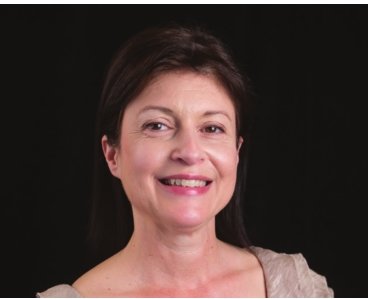
THERESA ROSADO: SPIRITS IN THE HOUSE Art works! Art generates tourism, creates jobs, gives kids a creative edge! We hear the Chamber of Commerce's cash-cow case for the arts so often — even from the arts community— it’s easy to forget what art can do when it’s untethered from money.
Fortunately, journalist, artist, photographer, activist and gallery owner Theresa Rosado is here to remind us.
Rosado has turned her historic, 100-yearold house on Mt. Hope Avenue near REO Town into a cozy, humming art gallery and community hub. Offbeat exhibits range from art inspired by social justice issues to the forbidden pleasures of velvet art and explicit photographs of male nudes.
“I’m more interested in what’s on the wall, the content, than in sales,” she said. “Content often takes a back seat to what sells, but I wanted that to be different here.”
The Mt. Hope house — now “Casa de Rosado” — fascinated her as she walked through the neighborhood a few years ago. It reminded her of one of her own paintings, “Flying Girl,” depicting a girl flying over a Mediterranean house with clay tile roof.
She painted spirits in the house. “In the windows you could see little shadows of ancestors,” she said.
She wanted to capture the community feel of Old Town in its early years, when it was a close-knit enclave of scrappy, activist artists.
“We had Otherwise Gallery, Real World Emporium, a community of thinkers and artists that pushed the boundaries of content and meaning and expression,” she said.
“I wanted a safe space for people to do that here. I didn’t want them to feel like they had to pay a fee up front to show, or had some kind of public limit to what they could show.”
As a journalist, Rosado’s investigative work has appeared most recently in Nouveau, an Indianapolis weekly. In 2015, she wrote a major piece on a Christian boarding school, New Horizons Ministry, looking into allegations of abuse from current and former students.
When students came to her with accounts of being abused, she validated their stories by correlating court and child service records with their stories.
“All of these things connect,” she said.
“I’m sensitive to communities that experience vulnerability, or they are victims to this morality play in the U.S. of who gets to write laws for children, immigrants, the LGBTQI community. These are vulnerable communities, they all interconnect, and that’s why I’m drawn to write about them.”
She plans to take the summer off to plan the gallery’s next phase and look into ways to “make it viable in the longer term.”
She’ll also spend time fixing masonry, plumbing and “all kinds of things” necessary to keep up a 100-year-old house.
“I would normally have a house full of art, so I consider this an extension of my home, except that I keep it neater and cleaner than my actual living space,” she admitted.
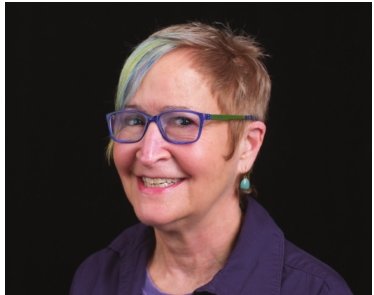
MAXINE THOME: EDUCATE AND LEGISLATE Maxine Thome, 67, has served as director of the Michigan chapter of the National Association of Social Workers for 17 years. “I’m in an ideal spot to educate and legislate, because I’m executive director and I’m an out lesbian,” she said.
Thome was a co-founder of the Lansing Area Aids Network and worked on legislation relating to gay marriage, for which NASW was a strong advocate.
Same-sex marriage is a reality, but in today’s charged political climate, new challenges arise by the week. In Thome’s private practice, about 75 percent of her clients are transgender people who are transitioning.
The day we talked, Thome was worried about a bill requiring people who rely on Medicaid to work or lose their health care that had just passed in the state House of Representatives.
Job seeking is one of the most stressful things in the life of a transgender person. It often takes extra time to find a sympathetic work environment. “If someone’s required to find a job, and they can’t find it within the three-month window, it could be devastating,” Thome said.
Transgender people are especially vulnerable to a range of physical and mental health challenges, but they’re not getting the support they need.
“As a private practice clinician, if I use the term ‘gender dysphoria’ in diagnosis, more often than not, the claim is rejected,” Thome said.
Her clients range in age from 11 to 70. Young people are in particular need of support.
“The good news is, the LGBT kids somehow find each other, but more programs are sorely needed,” she said. "They don’t know whether to go with the gender on their birth certificate or who they really are. The kids really struggle. It can be agonizing.”
A rise in “ultra-conservative right wing religious programs” also alarms Thome. “The push in NASW is to move legislation forward to ban conversion therapy,” Thome said. “That is really critical. Hate crimes aren’t going away. That affects everyone in the LGBT community. The more identifiable you are, the more at risk you are.”
With that comes an ominous trend. “If you can fly under the radar, or assimilate, you’ll survive if you deny your identity,” she said. “I also have a Jewish background and I see too many parallels to Nazi Germany.”
Another of Thome’s top concerns right now is that younger people “aren’t realizing that HIV/AIDS is still alive and well. There’s a lot of practice of unsafe sex,” she said. “The AIDS epidemic isn’t over.”
Thome knows that social work is notorious for burnout, but she’s a lifer. Retirement is not yet on her docket.
“This is my passion, what keeps me alive.
I’ve been a Type 1 diabetic for 58 years. I’m amazingly healthy and I don’t want to let go of the fight.”
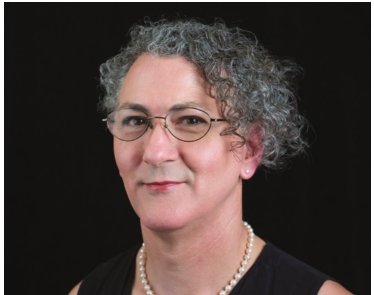
ERICA FITZBADEN: TRANS AND GAY Erica Fitzbaden, 54, is a transgender woman who is attracted to women. That often confuses people.
“It takes a few minutes to explain to people that I’m a trans woman, but I’m also a lesbian,” she said. Fitzbaden came out as a trans woman just a few years ago, but she’s been married to the same supportive woman, with whom she has three grown children, since 1991.
Fitzbaden finds herself doing a lot of explaining. Chatting with a fellow attendee at last year’s Jackson Pride events, Fitzbaden mentioned that her spouse was a woman. “It took her a little bit there,” she said. “She was like, ‘Wait, you’re not gay?’ I said, ‘Actually, I’m heli-gay, I’m a lesbian!’ Fitzbaden had an awakening when film-maker Lana Wachowski talked about her suicidal thoughts while growing up transgender in a speech in 2012, accepting the HRC Visibility Award. The Wachowski brothers, co-directors of the cult film “The Matrix,” came out in 2010 as the Wachowski sisters, Lana and Lilly.
“I went, ‘Yes, that’s totally me!’” Fitzbaden said. “I was out for a run one day and just said it out loud: ‘I’m a trans woman!’ It was just amazing to say it out loud. I cried, I laughed, I yelled.”
The transition hasn’t been totally smooth.
A longtime friend at work suddenly disappeared. “She wouldn’t speak to me or go to the bathroom on the same floor for fear of running into me,” she said.
Fitzbaden spoke memorably to hundreds of people at the Rally Against Hate at MSU’s Rock the night Donald Trump was elected. She’s been active at the LAHR table at Pride events, at the Transgender Michigan table at various events, has done LGBTQ training for the state, and even met with the Ingham County Sheriff’s office to coach people on language and pronouns.
“It wasn’t well received, but we tried,” she said.
She made a point of showing up at meetings of the Williamston school board and state board of education when they formulated policies affecting transgender students.
“I felt I just had to show up because it’s good they get a chance to see what a trans woman looks like — very normal.”
Overall, she feels privileged and dutybound to help those who don’t enjoy the support he has.
“I have support of family. I have a job. I can actually go out there and use my voice,” she said. “That’s why I do it. It’s a privilege that makes me want to do it.”
Not that it gets any easier. “The folks go on and on, it’s always the same points,” she said. “‘It’s mental illness, you’re reading the wrong books.’ They’re quoting books that are out of date, studies that have been debunked, quotes from the Bible.
It’s always the same nonsense. But you don’t get to decide what I am. That’s what it comes down to.”
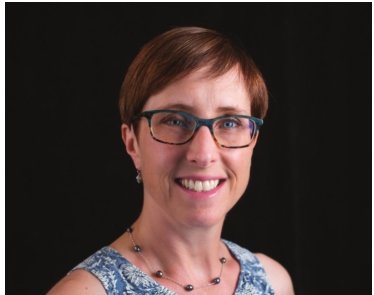
NICOLE ELLEFSON: FAMILY SUPPORT Nicole Ellefson learned a lot when her son, Reid Ellefson-Frank, came out as transgender after his sophomore year at Williamston High School.
Ellefson quickly evolved from sympathetic bystander to vocal and visible organizer and spokeswoman for LGBTQ kids as the community and the schools worked out a policy supporting kids like Reid.
There were great days and bad days. Ellefson’s 99-year-old grandmother died Sept. 25, shortly before a big, contentious school board meeting. She found herself going from a funeral to a crucible of “angry, negative comments.”
“You know there are people who oppose equality for LGBTQ people, but what was really hard was the level at which people were completely comfortable saying things like ‘LGBTQ people are sick, dangerous, wrong before God’ and such things,” Ellefson said. “You know people feel like that, but it’s another thing to hear it over and over again.”
What gave her hope is that hundreds of allies also showed up, from within the community and around the Lansing area.
“There was such an outpouring of energy, love, acceptance and support for the school board,” she said. “In the hardest moments, I think about the people who didn’t even have an LGBTQ kid, but felt it was important enough to come to a meeting or write a letter to the board. That was a balm for the salt in the wound of hearing so many hateful things.”
Advocacy is a time investment. Besides speaking at the Williamston meetings, Ellefson went to a year-long workshop sponsored by the ACLU to help parents become better advocates for their LGBTQ kids. She and Reid also went to state school board meetings as Michigan hammered out a model policy for supporting LGBTQ kids in school.
It took away from time that could have been spent just doing regular family stuff, but Ellefson knows that family support is the number one predictor of health, happiness and safety from suicide for LGBT people.
“My husband, my daughter and my son all feel strongly about it,” she said. “My family has always been a place where I find joy and happiness. They’re just a great group of people. I hope someday every parent will love their child as they are and not see their coming out as a betrayal or an act against God or an illness in need of curing.”
The story in Williamston isn’t over.
Opponents of Williamston’s policy of recognizing students’ gender identity and insuring equal access to gender segregated facilities have filed over 40 recall petitions against school board members and a federal lawsuit alleging that the policies infringe upon their their First Amendment rights to freedom of religion. “I will continue to step up and do what’s needed to support the rights of all the kids in our district,” Ellefson said, “and do what I can to help our community be the best, kindest, most loving and inclusive place it can be.”

LAUREN ORDAIR: PEOPLE ARE LISTENING A Manhattan-based drag queen with huge hair and a goosebump-raising voice, Lauren Ordair, 31, is known in the Lansing area as Nick Page.
For Ordair, the great thing about doing drag is that “you become a part of the character” rather than working from someone else’s script, as in musical theater.
“Lauren is a character I created out of all the strengths I wanted to have,” he said. “All the fears I have are gone when Lauren is on. When I get to be her, she’s completely free. I get to be more witty and off-the-cuff with her than I ever would in a stage show.”
He loves to do a bit of story-telling schtick before every song.
“I look like a lady but swear like a sailor,” he said.
He loves being his own writer, choreographer, dresser, director, costume designer, makeup and hair artist.
“You get to build the whole image you want for yourself,” he said. “That also makes you extra vulnerable. You have to open your heart a little bit and see if it gets hurt.”
Ordair grew up in St. Johns. After graduating from high school, he went to New York to study musical theater. He graduated in vocal performance at the New School, performing pop, opera and musical theater with equal enthusiasm.
“If somebody asks me to sing it, I’ll learn it and sing it,” he said.
He first performed as a drag queen 10 years ago, at a bar contest. He sang “As Long as He Needs Me” from “Oliver!” After he sang, the drag queen next to me told him, “You have a very good voice and you’re pretty. Have you thought of doing drag?” Now he has gigs a-go-go. Tuesdays and Sundays, he works at Lips at 66th Street, between Second and Third avenues, in Manhattan. Sunday nights, he works at Cherry’s On the Bay in Cherry Grove on Long Island. On Thursdays, he does a show called “the Fat Lady Sings” at the Duplex Piano Bar on Christopher Street. On occasional Saturdays, he does a show at Icon.
His day begins at 2 p.m. and ends at 4 a.m. “My only issue is sometimes my voice gets tired,” he said. “But I love it. The only thing I’ve ever wanted to do in the world is sing and I’m just so happy people are listening.”
In college, he worked at a costume shop and learned to make his own costumes.
“I have all different types of costumes, but what I really love are glamorous, ladylike gowns,” he said.
His favorite outfit, and the one he plans to wear to the Inclusion Awards, is a tight, sequined, ruffle-edged gown that shimmers from green to silver as he moves.
“It’s very slimming, and I’m a lady of a certain size, so anything that helps me there, I like.”
Ordair will perform Thursday, Friday and Saturday, starting at 10 p.m., at the Grand Café Sir Pizza, beginning June 14.
City Pulse LGBTQ Inclusion Awards Party and Ceremony
Thursday, June 14 7 p.m. to 9 p.m Cocktail party 7 to 8; Awards ceremony 8 to 9. Spiral Dance Bar, 1247 Center St., Lansing Tickets, $20 in advance, $25 at the door. Includes food, half price drinks and admission to the Michigan Pride White Party the next night. In advance: www.lansingcitypulse.com or call Ella at (517) 999-6704
Support City Pulse - Donate Today!
Comments
No comments on this item Please log in to comment by clicking here